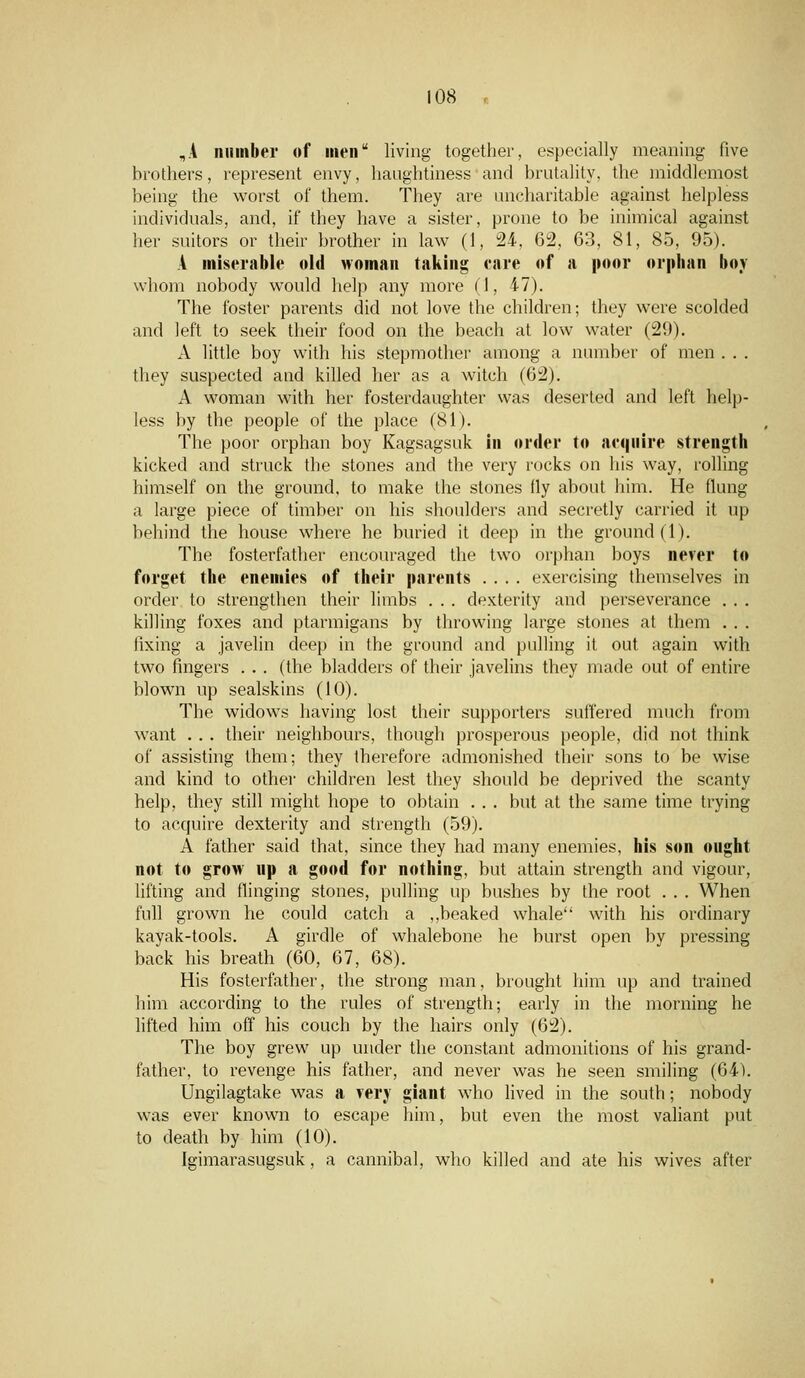
Full resolution (JPEG) - On this page / på denna sida - Elements of Traditions

<< prev. page << föreg. sida << >> nästa sida >> next page >>
Below is the raw OCR text
from the above scanned image.
Do you see an error? Proofread the page now!
Här nedan syns maskintolkade texten från faksimilbilden ovan.
Ser du något fel? Korrekturläs sidan nu!
This page has been proofread at least once.
(diff)
(history)
Denna sida har korrekturlästs minst en gång.
(skillnad)
(historik)
„A number of men“ living together, especially meaning five
brothers, represent envy, haughtiness and brutality, the middlemost
being the worst of them. They are uncharitable against helpless
individuals, and, if they have a sister, prone to be inimical against
her suitors or their brother in law (1, 24, 62, 63, 81, 85, 95).
A miserable old woman taking care of a poor orphan boy
whom nobody would help any more (1, 47).
The foster parents did not love the children; they were scolded
and left to seek their food on the beach at low water (29).
A little boy with his stepmother among a number of men . . .
they suspected and killed her as a witch (62).
A woman with her fosterdaughter was deserted and left
helpless by the people of the place (81).
The poor orphan boy Kagsagsuk in order to acquire strength
kicked and struck the stones and the very rocks on his way, rolling
himself on the ground, to make the stones fly about him. He flung
a large piece of timber on his shoulders and secretly carried it up
behind the house where he buried it deep in the ground (1).
The fosterfather encouraged the two orphan boys never to
forget the enemies of their parents . . . . exercising themselves in
order to strengthen their limbs . . . dexterity and perseverance . . .
killing foxes and ptarmigans by throwing large stones at them . . .
fixing a javelin deep in the ground and pulling it out again with
two fingers . . . (the bladders of their javelins they made out of entire
blown up sealskins (10).
The widows having lost their supporters suffered much from
want . . . their neighbours, though prosperous people, did not think
of assisting them; they therefore admonished their sons to be wise
and kind to other children lest they should be deprived the scanty
help, they still might hope to obtain . . . but at the same time trying
to acquire dexterity and strength (59).
A father said that, since they had many enemies, his son ought
not to grow up a good for nothing, but attain strength and vigour,
lifting and flinging stones, pulling up bushes by the root . . . When
full grown he could catch a „beaked whale" with his ordinary
kayak-tools. A girdle of whalebone he burst open by pressing
back his breath (60, 67, 68).
His fosterfather, the strong man, brought him up and trained
him according to the rules of strength; early in the morning he
lifted him off his couch by the hairs only (62).
The boy grew up under the constant admonitions of his
grandfather, to revenge his father, and never was he seen smiling (64).
Ungilagtake was a very giant who lived in the south; nobody
was ever known to escape him, but even the most valiant put
to death by him (10).
Igimarasugsuk, a cannibal, who killed and ate his wives after
<< prev. page << föreg. sida << >> nästa sida >> next page >>